Sir John Monash, Personal Files Book 11, 1 December - 25 December 1915, Part 10
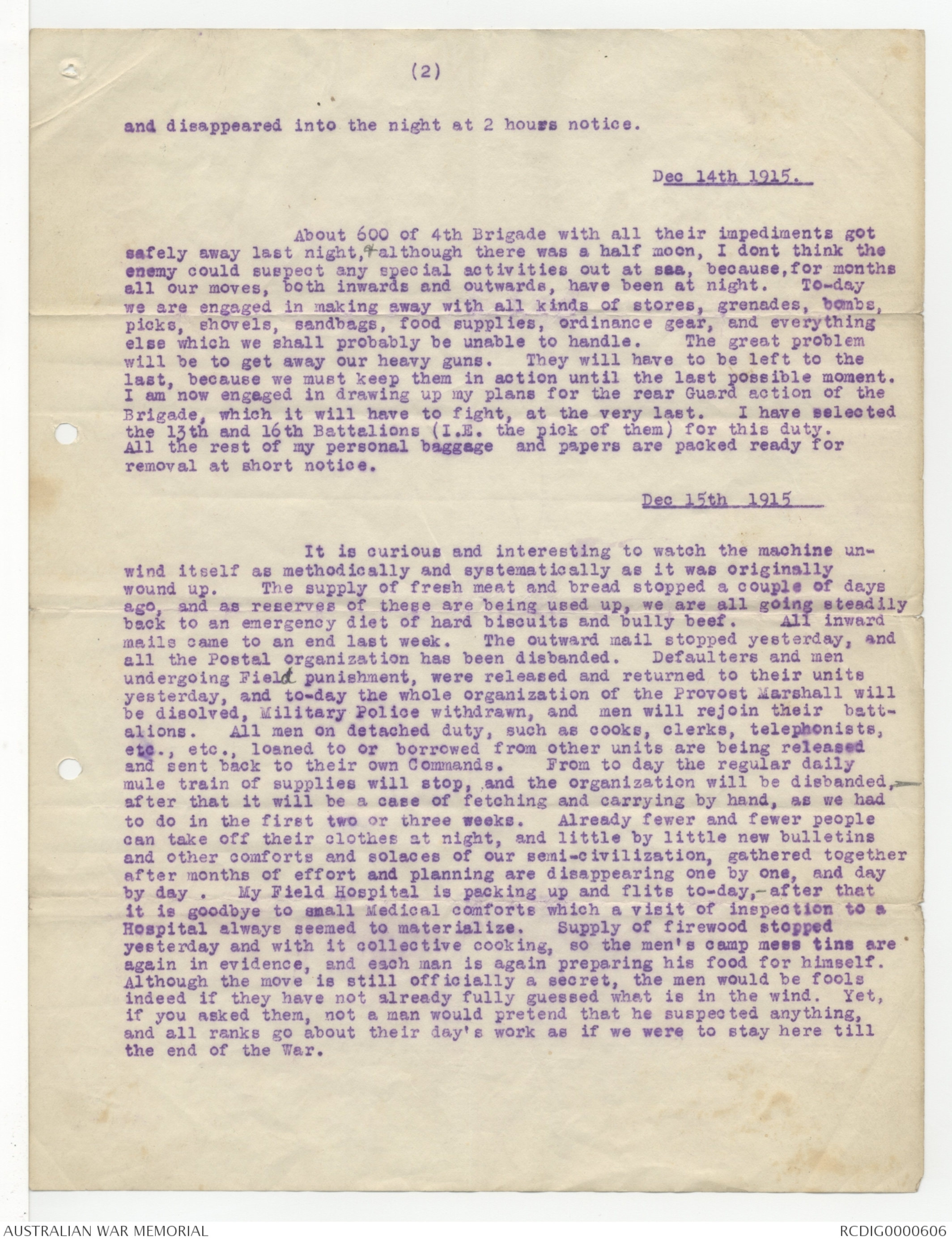
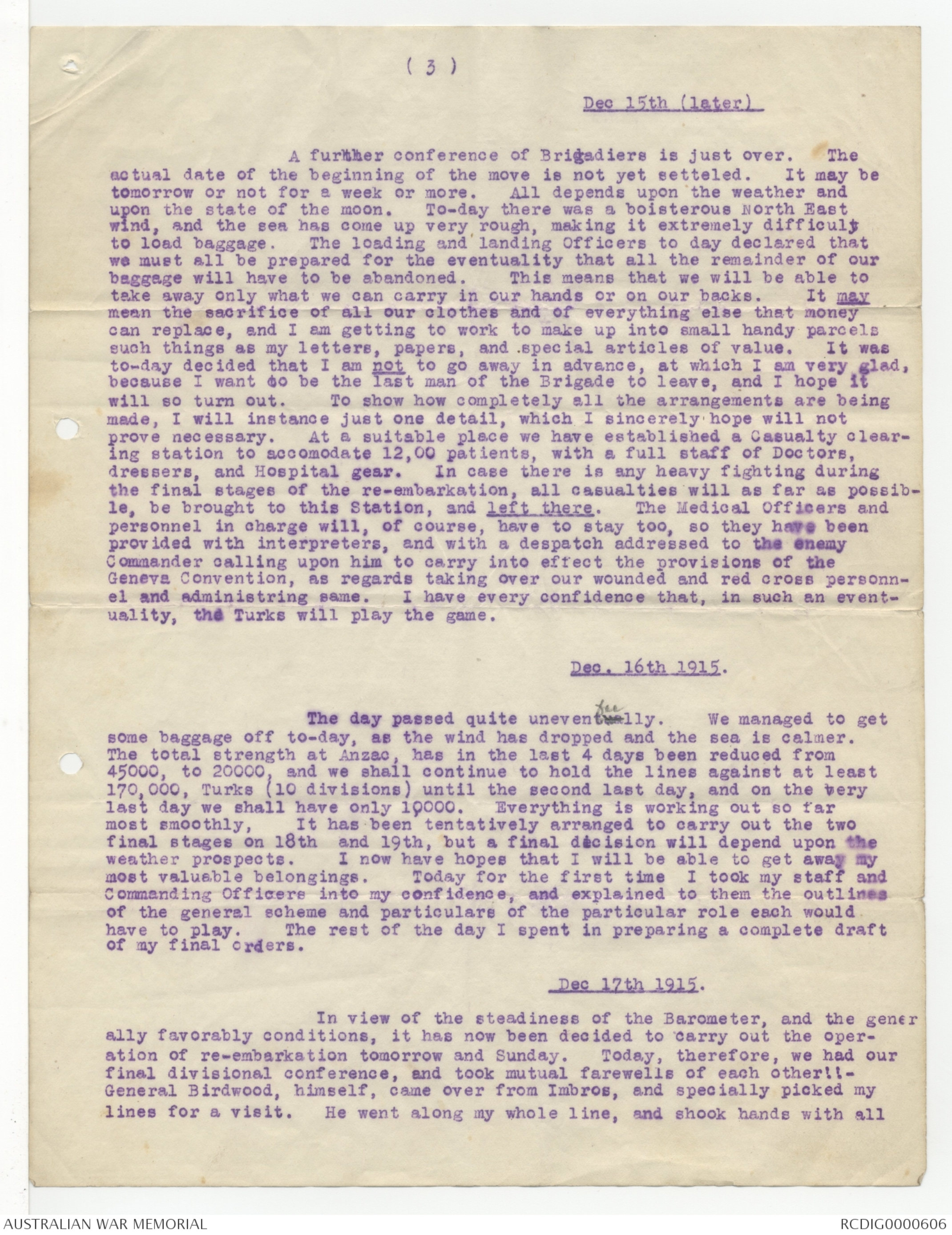
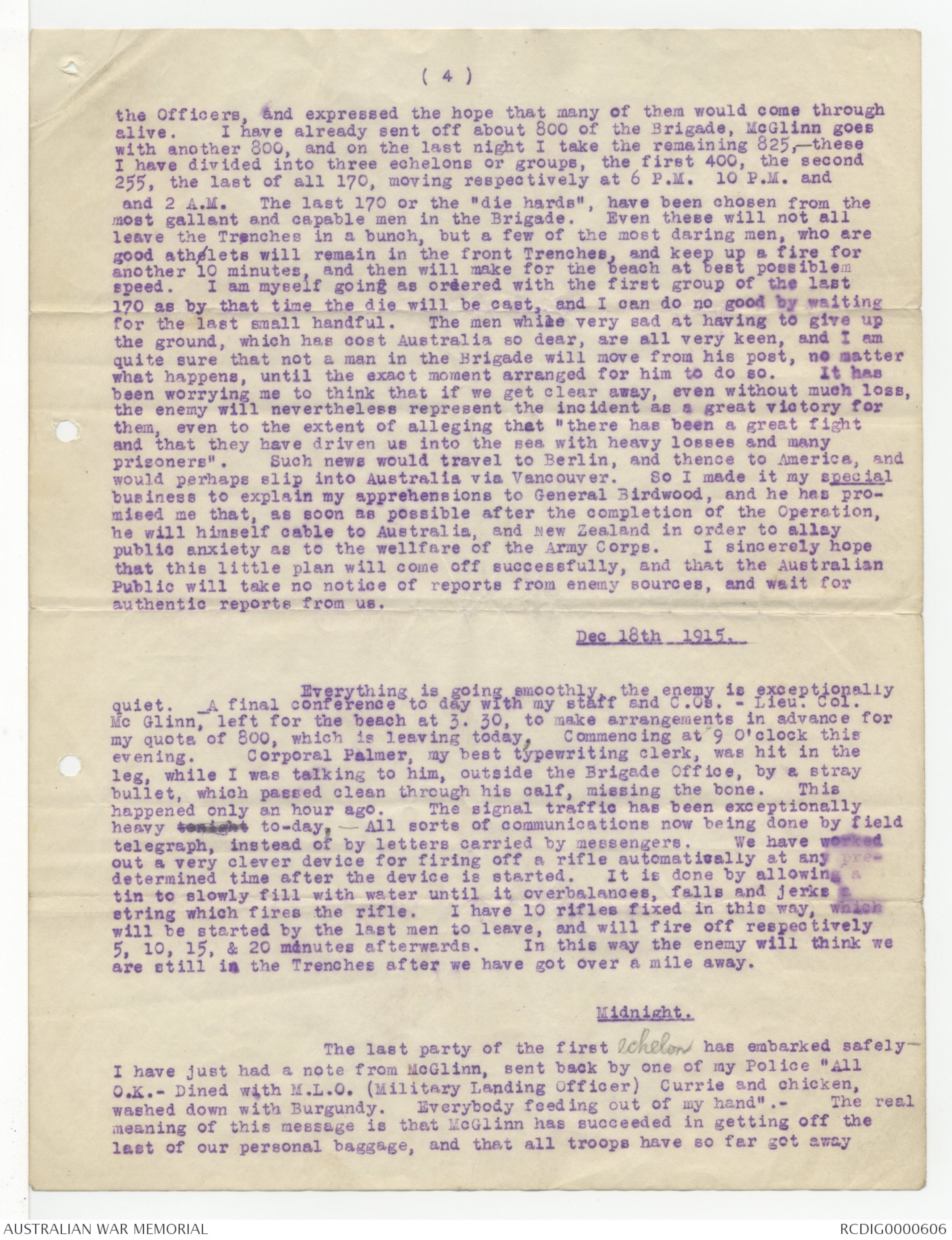
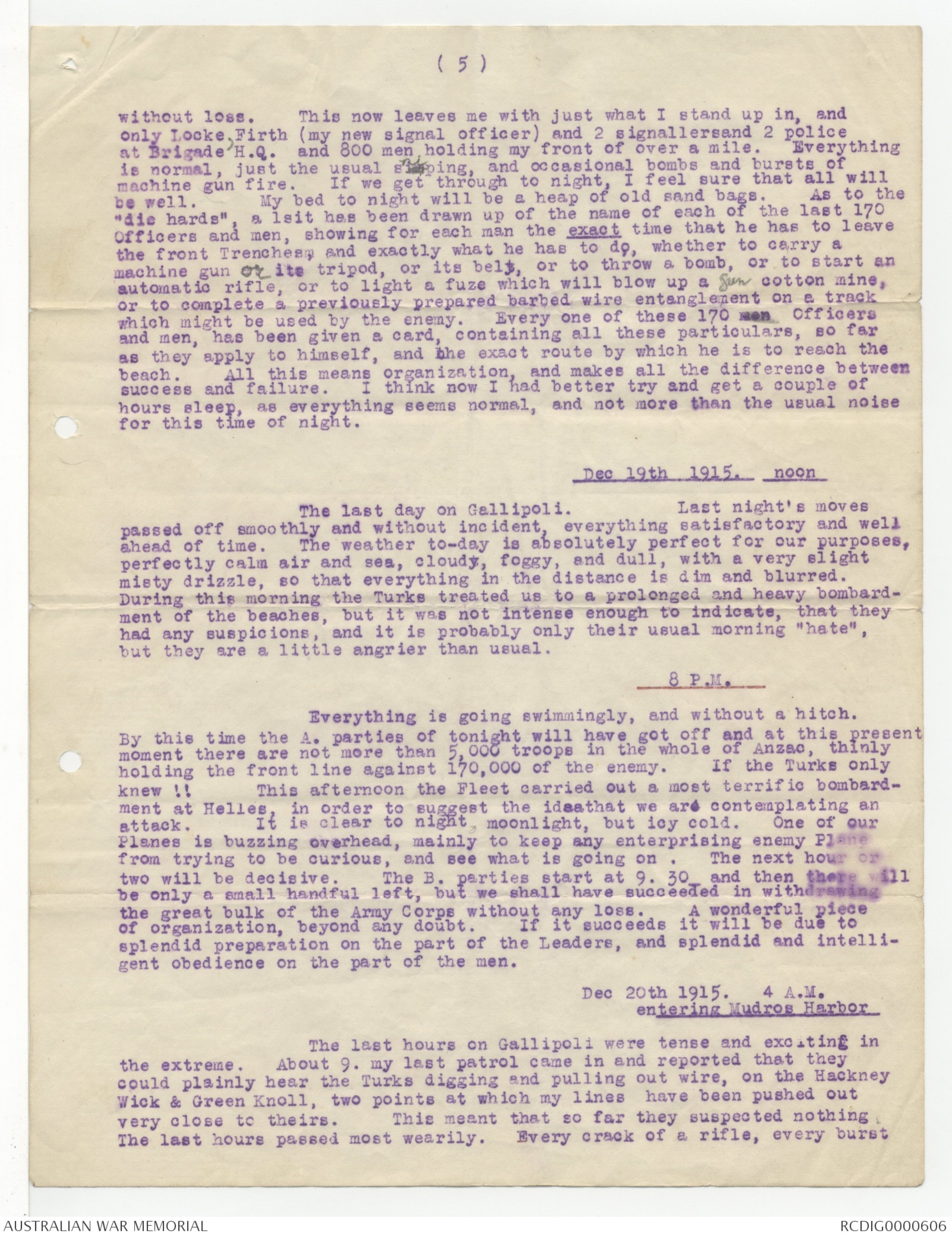
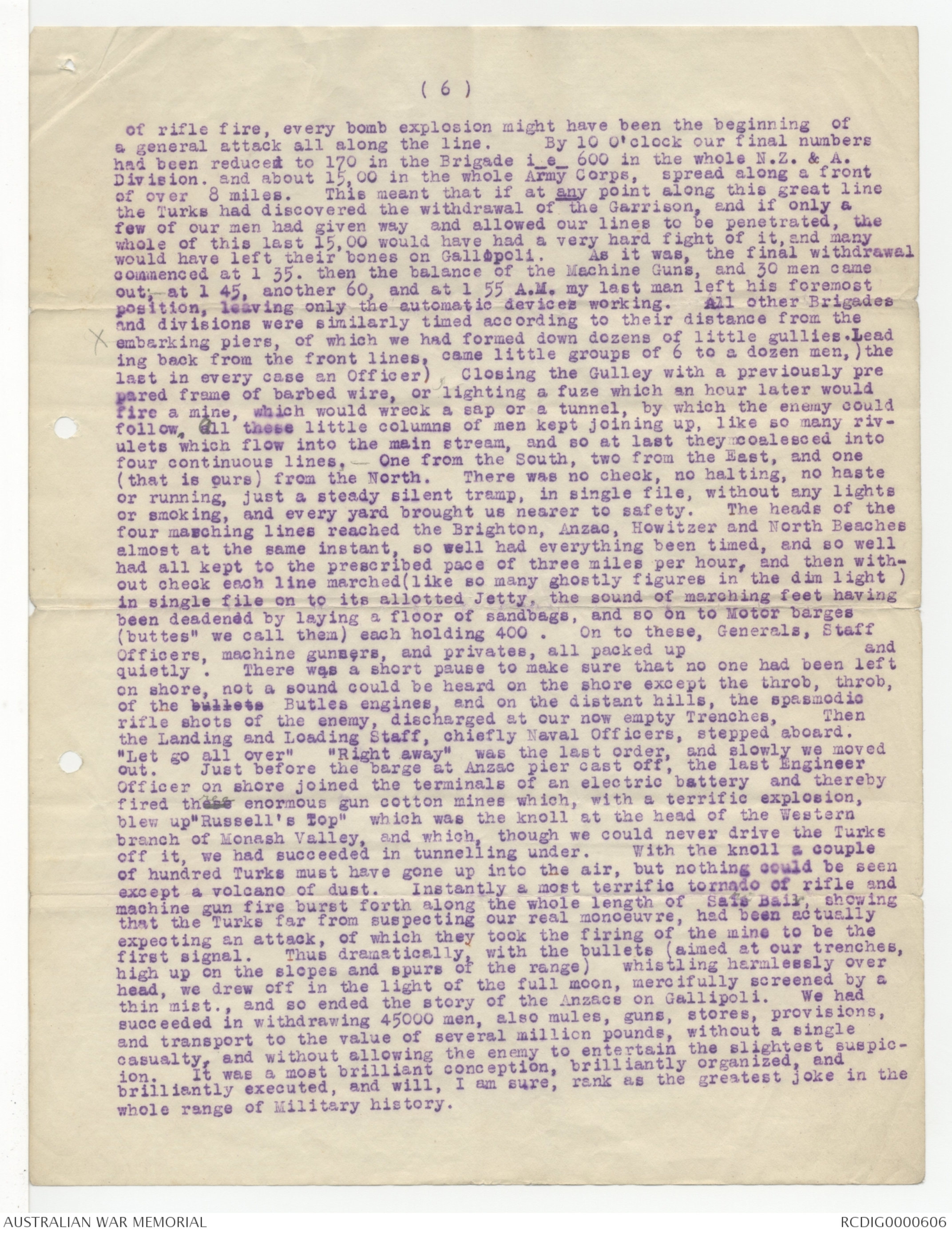
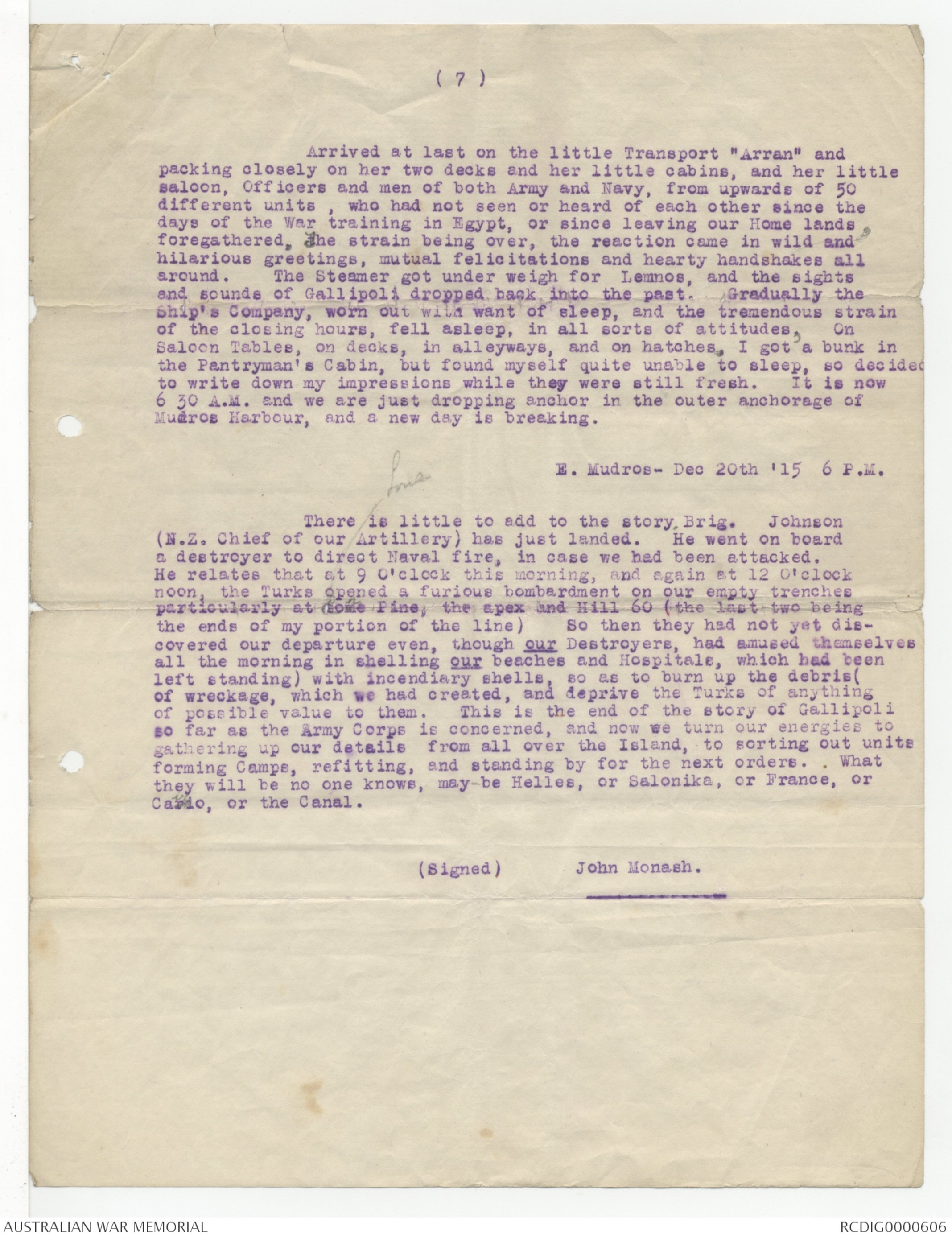
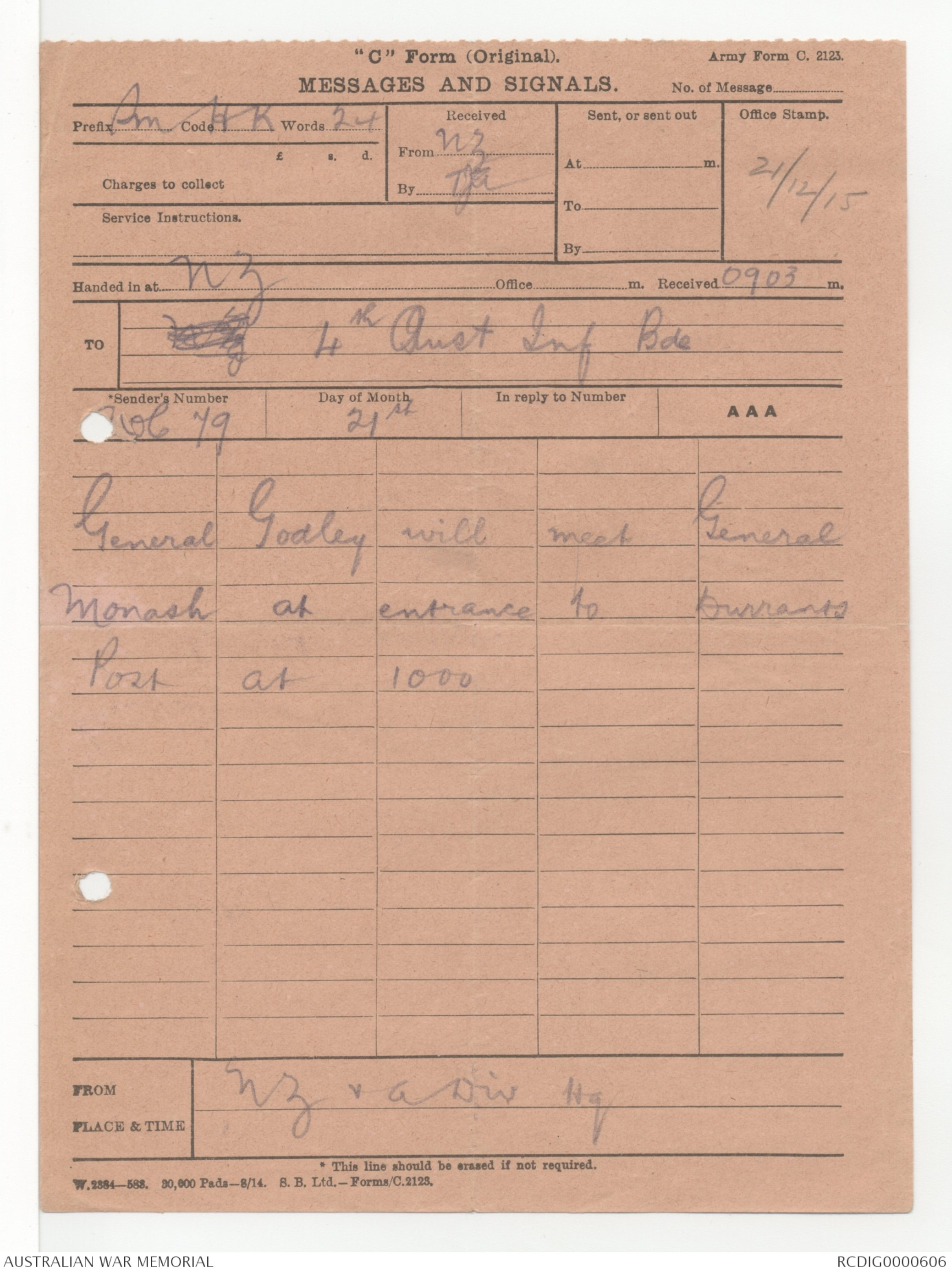
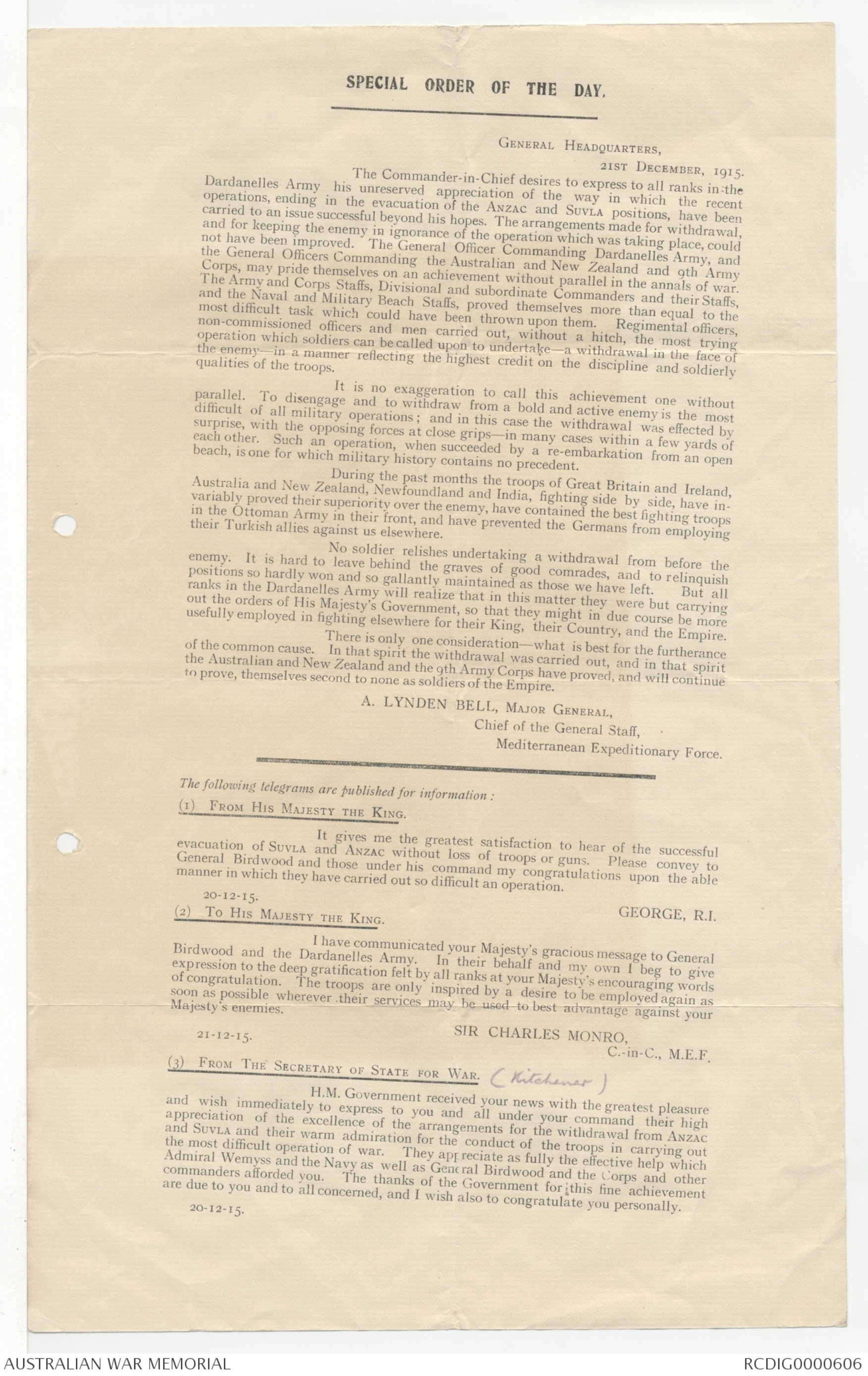
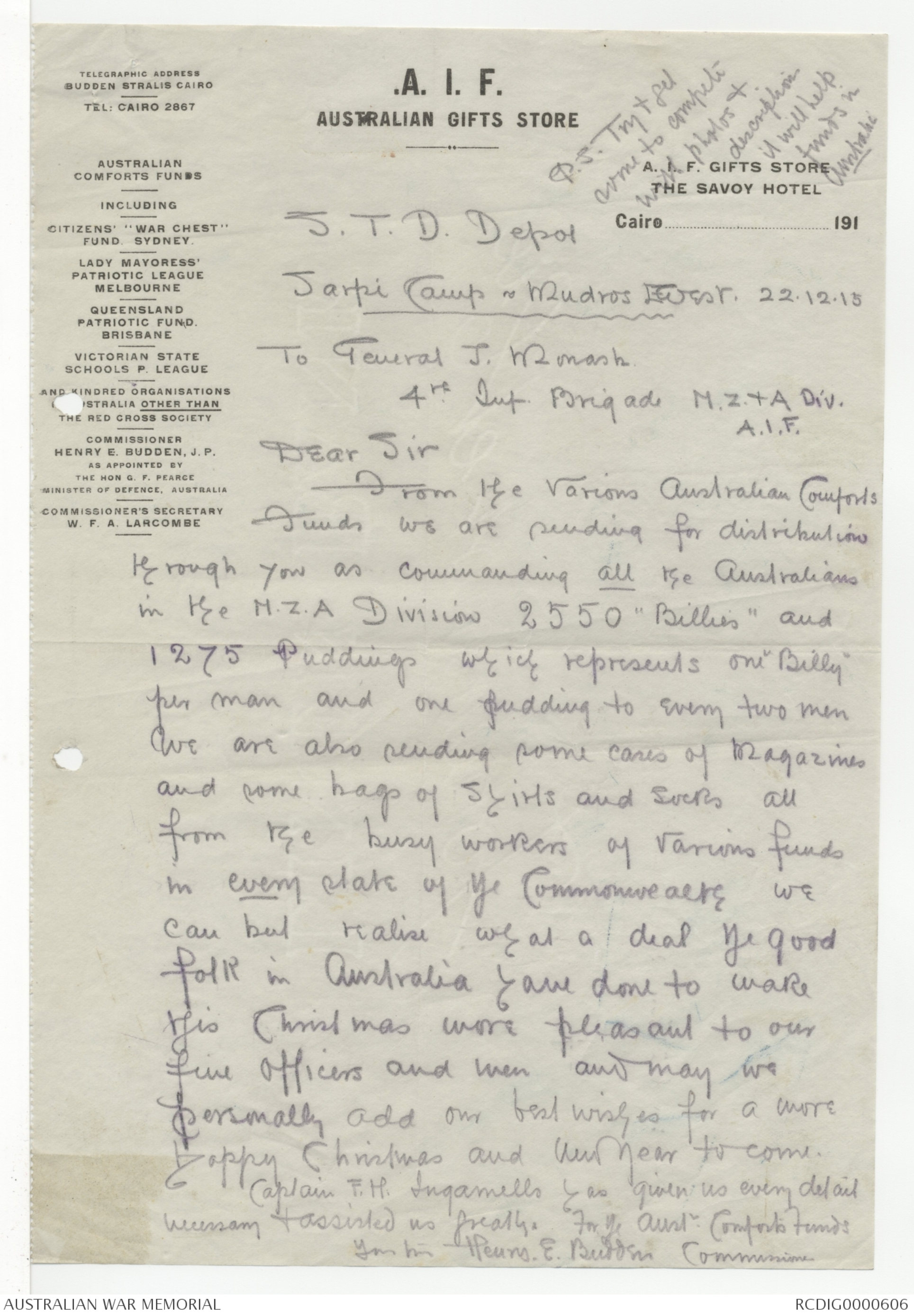
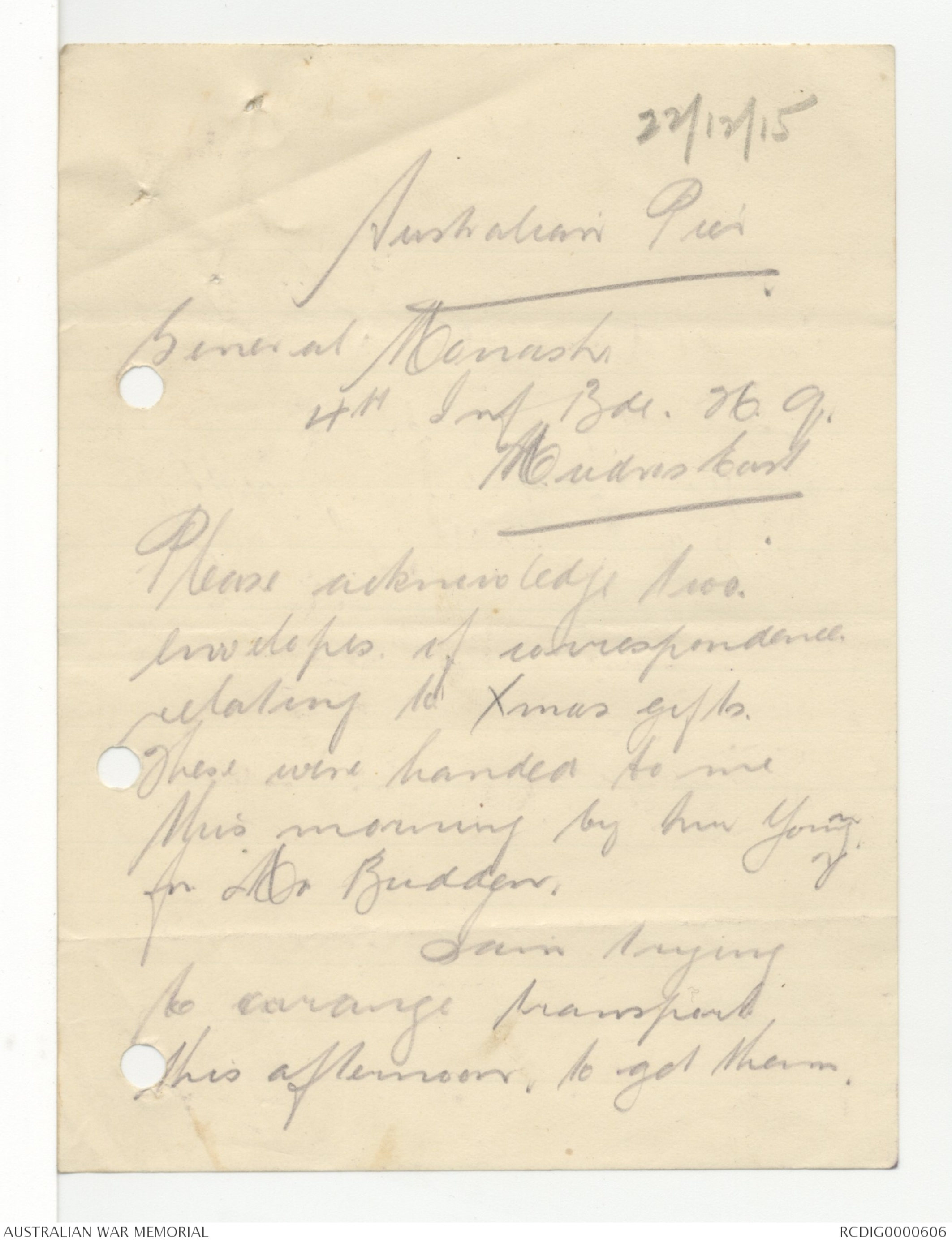
(2)
and disappeared into the night at 2 hours notice.
Dec 14th 1915.
About 600 of 4th Brigade with all their impediments got
safely away last night, & although there was a half moon, I dont think the
enemy could suspect any special activities out at sea, because, for months
we are engaged in making away with all kinds of stores, grenades, bombs,
picks, shovels, sandbags, food supplies, ordinance gear, and everything
else which we shall probably be unable to handle. The great problem
will be to get away our heavy guns. They will have to be left to the
last, because we must keep them in action until the last possible moment.
I am now engaged in drawing up my plans for the rear Guard action of the
Brigade, which it will have to fight, at the very last. I have selected
the 13th and 16th Battalions (I.E. the pick of them) for this duty.
All the rest of my personal baggage and papers are packed ready for
removal at short notice.
Dec 15th 1915
It is curious and interesting to watch the machine unwind
itself as methodically and systematically as it was originally
wound up. The supply of fresh meat and bread stopped a couple of days
ago, and as reserves of these are being used up, we are all going steadily
back to an emergency diet of hard biscuits and bully beef. All inward
mails came to an end last week. The outward mail stopped yesterday, and
all the Postal Organization has been disbanded. Defaulters and men
undergoing Field punishment, were released and returned to their units
yesterday, and to-day the whole organization of the Provost Marshall will
be disolved, Military Police withdrawn, and men will rejoin their battalions.
All men on detached duty, such as cooks, clerks, telephonists,
etc., etc., loaned to or borrowed from other units are being released
and sent back to their own Commands. From to day the regular daily
mule train of supplies will stop, and the organization will be disbanded, -
after that it will be a case of fetching, and carrying by hand, as we had
to do in the first two or three weeks. Already fewer and fewer people
can take off their clothes at night, and little by little new bulletins
and other comforts and solaces of our semi-civilization, gathered together
after months of effort and planning are disappearing one by one, and day
by day. My Field Hospital is packing up and flits to-day,-after that
it is goodbye to small Medical comforts which a visit of inspection to a
Hospital always seemed to materialize. Supply of firewood stopped
yesterday and with it collective cooking, so the men's camp mess tins are
again in evidence, and each man is again preparing his food for himself.
Although the move is still officially a secret, the men would be fools
indeed if they have not already fully guessed what is in the wind. Yet,
if you asked them, not a man would pretend that he suspected anything,
and all ranks go about their day's work as if we were to stay here till
the end of the War.
(3)
Dec 15th (later)
A further conference of Brigadiers is just over. The
actual date of the beginning of the move is not yet settled. It may be
tomorrow or not for a week or more. All depends upon the weather and
upon the state of the moon. To-day there was a boisterous North East
wind, and the sea has come up very rough, making it extremely difficult
to load baggage. The loading and landing Officers to day declared that
we must all be prepared for the eventuality that all the remainder of our
baggage will have to be abandoned. This means that we will be able to
take away only what we can carry in our hands or on our backs. It may
mean the sacrifice of all our clothes and of everything else that money
can replace, and I am getting to work to make up into small handy parcels
such things as my letters, papers, and special articles of value. It was
to-day decided that I am not to go away in advance, at which I am very glad,
because I want to be the last man of the Brigade to leave, and I hope it
will so turn out. To show how completely all the arrangements are being
made, I will instance just one detail, which I sincerely hope will not
prove necessary. At a suitable place we have established a Casualty clearing
station to accomodate 12,00 patients, with a full staff of Doctors,
dressers, and Hospital gear. In case there is any heavy fighting during
the final stages of the re-embarkation, all casualties will as far as possible,
be brought to this Station, and left there. The Medical Officers and
personnel in charge will, of course, have to stay too, so they have been
provided with interpreters, and with a despatch addressed to the enemy
Commander calling upon him to carry into effect the provisions of the
Geneva Convention, as regards taking over our wounded and red cross personnel
and administering same. I have every confidence that, in such an eventuality,
the Turks will play the game.
Dec. 16th 1915.
The day passed quite uneventfully. We managed to get
some baggage off to-day, as the wind has dropped and the sea is calmer.
The total strength at Anzac, has in the last 4 days been reduced from
45000 to 20000, and we shall continue to hold the lines against at least
170,000, Turks (10 divisions) until the second last day, and on the very
last day we shall have only 10000. Everything is working out so far
most smoothly. It has been tentatively arranged to carry out the two
final stages on 18th and 19th, but a final decision will depend upon the
weather prospects. I now have hopes that I will be able to get away my
most valuable belongings. Today for the first time I took my staff and
Commanding Officers into my confidence, and explained to them the outlines
of the general scheme and particulars of the particular role each would
have to play. The rest of the day I spent in preparing a complete draft
of my final orders.
Dec. 17th 1915.
In view of the steadiness of the Barometer, and the generally
favorably conditions, it has now been decided to carry out the operation
of re-embarkation tomorrow and Sunday. Today, therefore, we had our
final divisional conference, and took mutual farewells of each other!!-
General Birdwood, himself, came over from Imbros, and specially picked my
lines for a visit. He went along my whole line, and shook hands with all
(4)
the Officers, and expressed the hope that many of them would come through
alive. I have already sent off about 800 of the Brigade, McGlinn goes
with another 800, and on the last night I take the remaining 825,--these
I have divided into three echelons or groups, the first 400, the second
255, the last of all 170, moving respectively at 6 P.M. 10 P.M. and
and 2 A.M. The last 170 or the "die hards", have been chosen from the
most gallant and capable men in the Brigade. Even these will not all
leave the Trenches in a bunch, but a few of the most daring men, who are
good athelets will remain in the front Trenches, and keep up a fire for
another 10 minutes, and then will make for the beach at best possible
speed. I am myself going as ordered with the first group of the last
170 as by that time the die will be cast, and I can do no good by waiting
for the last small handful. The men while very sad at having to give up
the ground, which has cost Australia so dear, are all very keen, and I am
quite sure that not a man in the Brigade will move from his post, no matter
what happens, until the exact moment arranged for him to do so. It has
been worrying me to think that if we get clear away, even without much loss,
the enemy will nevertheless represent the incident as a great victory for
them, even to the extent of alleging that "there has been a great fight
and that they have driven us into the sea with heavy losses and many
prisoners". Such news would travel to Berlin, and thence to America, and
would perhaps slip into Australia via Vancouver. So I made it my special
business to explain my apprehensions to General Birdwood, and he has promised
me that, as soon as possible after the completion of the Operation,
he will himself cable to Australia, and New Zealand in order to allay
public anxiety as to the wellfare of the Army Corps. I sincerely hope
that this little plan will come off successfully, and that the Australian
Public will take no notice of reports from enemy sources, and wait for
authentic reports from us.
Dec. 18th 1915.
Everything is going smoothly, the enemy is exceptionally
quiet. _A final conference to day with my staff and C.Os. - Lieu . Col .
Mc Glinn, left for the beach at 3 . 30, to make arrangements in advance for
my quota of 800, which is leaving today, Commencing at 9 O'clock this
evening. Corporal Palmer, my best typewriting clerk, was hit in the
leg, while I was talking to him, outside the Brigade Office, by a stray
bullet, which passed clean through his calf, missing the bone. This
happened only an hour ago. The signal traffic has been exceptionally
heavy tonight to-day. All sorts of communications now being done by field
telegraph, instead of by letters carried by messengers. We have worked
out a very clever device for firing off a rifle automatically at any pre-determined
time after the device is started. It is done by allowing a
tin to slowly fill with water until it overbalances, falls and jerks a
string which fires the rifle. I have 10 rifles fixed in this way, which
will be started by the last men to leave, and will fire off respectively
5, 10, 15, & 20 minutes afterwards. In this way the enemy will think we
are still in the Trenches after we have got over a mile away.
Midnight.
The last party of the first echelon has embarked safely -
I have just had a note from McGlinn, sent back by one of my Police "All
O.K. - Dined with M.L.O. (Military Landing Officer) Currie and chicken,
washed down with Burgundy. Everybody feeding out of my hand".- The real
meaning of this message is that McGlinn has succeeded in getting off the
last of our personal baggage, and that all troops have so far got away
(5)
without loss. This now leaves me with just what I stand up in, and
only Locke, Firth (my new signal officer) and 2 signallers and 2 police
at Brigade H.Q. and 800 men holding my front of over a mile. Everything
is normal, just the usual sniping, and occasional bombs and bursts of
machine gun fire. If we get through to night, I feel sure that all will
be well. My bed to night will be a heap of old sand bags. As to the
"die hards", a lsit has been drawn up of the name of each of the last 170
Officers and men, showing for each man the exact time that he has to leave
the front Trenches, and exactly what he has to do, whether to carry a
machine gun or its tripod, or its belt, or to throw a bomb, or to start an
automatic rifle, or to light a fuze which will blow up a gun cotton mine,
or to complete a previously prepared barbed wire entanglement on a track
which might be used by the enemy. Every one of these 170 men, Officers
and men, has been given a card, containing all these particulars, so far
as they apply to himself, and the exact route by which he is to reach the
beach. All this means organization, and makes all the difference between
success and failure. I think now I had better try and get a couple of
hours sleep, as everything seems normal, and not more than the usual noise
for this time of night.
Dec. 19th 1915. noon
The last day on Gallipoli. Last night's moves
passed off smoothly and without incident, everything satisfactory and well
ahead of time. The weather to-day is absolutely perfect for our purposes,
perfectly calm air and sea, cloudy, foggy, and dull, with a very slight
misty drizzle, so that everything in the distance is dim and blurred.
During this morning the Turks treated us to a prolonged and heavy bombardment
of the beaches, but it was not intense enough to indicate, that they
had any suspicions, and it is probably only their usual morning "hate",
but they are a little angrier than usual.
8 P.M.
Everything is going swimmingly, and without a hitch.
By this time the A. parties of tonight will have got off and at this present
moment there are not more than 5,000 troops in the whole of Anzac, thinly
holding the front line against 170,000 of the enemy. If the Turks only
knew !! This afternoon the Fleet carried out a most terrific bombardment
at Helles, in order to suggest the idea that we are contemplating an
attack. It is clear to night, moonlight, but icy cold. One of our
Planes is buzzing overhead, mainly to keep any enterprising enemy Plane
from trying to be curious, and see what is going on. The next hour or
two will be decisive. The B. parties start at 9. 30 and then there will
be only a small handful left, but we shall have succeeded in withdrawing
the great bulk of the Army Corps without any loss. A wonderful piece
of organization, beyond any doubt. If it succeeds it will be due to
splendid preparation on the part of the Leaders, and splendid and intelligent
obedience on the part of the men.
Dec. 20th 1915. 4 A.M.
entering Mudros Harbor
The last hours on Gallipoli were tense and exciting in
the extreme. About 9. my last patrol came in and reported that they
could plainly hear the Turks digging and pulling out wire, on the Hackney
Wick & Green Knoll, two points at which my lines have been pushed out
very close to theirs. This meant that so far they suspected nothing.
The last hours passed most wearily. Every crack of a rifle, every burst
(6)
of rifle fire, every bomb explosion might have been the beginning of
a general attack all along the line. By 10 o'clock our final numbers
had been reduced to 170 in the Brigade i_e_ 600 in the whole N.Z. & A.
Division. and about 15,00 in the whole Army Corps, spread along a front
of over 8 miles. This meant that if at any point along this great line
the Turks had discovered the withdrawal of the Garrison, and if only a
few of our men had given way and allowed our lines to be penetrated, the
whole of this last 15,00 would have had a very hard fight of it, and many
would have left their bones on Gallipoli. As it was, the final withdrawal
commenced at 1 35. then the balance of the Machine Guns, and 30 men came
out; at 1 45, another 60, and at 1 55 A.M. my last man left his foremost
position, leaving only the automatic devices working. All other Brigades
and divisions were similarly timed according to their distance from the
X embarking piers, of which we had formed down dozens of little gullies. Leading
back from the front lines, came little groups of 6 to a dozen men, )the
last in every case an Officer), Closing the Gulley with a previously prepared
frame of barbed wire, or lighting a fuze which an hour later would
fire a mine, which would wreck a sap or a tunnel, by which the enemy could
follow. All these little columns of men kept joining up, like so many rivulets
which flow into the main stream, and so at last they coalesced into
four continuous lines, - One from the South, two from the East, and one
( that is ours ) from the North. There was no check, no halting, no haste
or running, just a steady silent tramp, in single file, without any lights
or smoking, and every yard brought us nearer to safety. The heads of the
four marching lines reached the Brighton, Anzac, Howitzer and North Beaches
almost at the same instant, so well had everything been timed, and so well
had all kept to the prescribed pace of three miles per hour, and then without
check each line marched ( like so many ghostly figures in the dim light )
in single file on to its allotted Jetty, the sound of marching feet having
been deadened by laying a floor of sandbags, and so on to Motor barges
( buttes" we call them ) each holding 400. On to these, Generals, Staff
Officers, machine gunners, and privates, all packed up and
quietly. There was a short pause to make sure that no one had been left
on shore, not a sound could be heard on the shore except the throb, throb,
of the bullets Butles engines, and on the distant hills, the spasmodic
rifle shots of the enemy, discharged at our now empty Trenches, Then
the Landing and Loading Staff, chiefly Naval Officers, stepped aboard.
"Let go all over" "Right away" was the last order, and slowly we moved
out. Just before the barge at Anzac pier cast off, the last Engineer
Officer on shore joined the terminals of an electric battery and thereby
fired theseree enormous gun cotton mines which, with a terrific explosion,
blew up "Russell's Top" which was the knoll at the head of the Western
branch of Monash Valley, and which, though we could never drive the Turks
off it, we had succeeded in tunnelling under. With the knoll a couple
of hundred Turks must have gone up into the air, but nothing could be seen
except a volcano of dust. Instantly a most terrific tornado of rifle and
machine gun fire burst forth along the whole length of Sairri Bair, showing
that the Turks far from suspecting our real manoeuvre, had been actually
expecting an attack, of which they took the firing of the mine to be the
first signal. Thus dramatically, with the bullets (aimed at our trenches,
high up on the slopes and spurs of the range) whistling harmlessly over
head, we drew off in the light of the full moon, mercifully screened by a
thin mist., and so ended the story of the Anzacs on Gallipoli. We had
succeeded in withdrawing 45000 men, also mules, guns, stores, provisions,
and transport to the value of several million pounds, without a single
casualty, and without allowing the enemy to entertain the slightest suspicion.
It was a most brilliant conception, brilliantly organized, and
brilliantly executed, and will, I am sure, rank as the greatest joke in the
whole range of Military history.
(7)
Arrived at last on the little Transport "Arran" and
packing closely on her two decks and her little cabins, and her little
saloon, Officers and men of both Army and Navy, from upwards of 50
different units , who had not seen or heard of each other since the
days of the War training in Egypt, or since leaving our Home lands
foregathered, the strain being over, the reaction came in wild and
hilarious greetings, mutual felicitations and hearty handshakes all
around. The Steamer got under weigh for Lemnos, and the sights
and sounds of Gallipoli dropped back into the past. Gradually the
ship's Company, worn out with want of sleep, and the tremendous strain
of the closing hours, fell asleep, in all sorts of attitudes, On
Saloon Tables, on decks, in alleyways, and on hatches, I got a bunk in
the Pantryman's Cabin, but found myself quite unable to sleep, so decided
to write down my impressions while they were still fresh. It is now
6 30 A.M. and we are just dropping anchor in the outer anchorage of
Mudros Harbour, and a new day is breaking.
E. Mudros - Dec 20th '15 6 P.M.
There is little to add to the story. Brig. Johnson
(N.Z. Chief of our Artillery) has just landed. He went on board
a destroyer to direct Naval fire, in case we had been attacked.
He relates that at 9 o'clock this morning, and again at 12 O'clock
noon, the Turks opened a furious bombardment on our empty trenches
particularly at Lone Pine, the apex and Hill 60 ( the last two being
the ends of my portion of the line ) So then they had not yet discovered
our departure even, though our Destroyers, had amused themselves
all the morning in shelling our beaches and Hospitals, which had been
left standing) with incendiary shells, so as to burn up the debris(
of wreckage, which we had created, and deprive the Turks of anything
of possible value to them. This is the end of the story of Gallipoli
so far as the Army Corps is concerned, and now we turn our energies to
gathering up our details from all over the Island, to sorting out units
forming Camps, refitting, and standing by for the next orders. What
they will be no one knows, may-be Helles, or Salonika, or France, or
Cairo, or the Canal.
( Signed ) John Monash.
"C" Form (Original).
Army Form C. 2123.
MESSAGES AND SIGNALS. No. of Message
Prefix SM Code HK Words 24
₤ s. d.
Charges to collect
Service Instructions.
Received
From NZ
By TJA
Sent, or sent out
At m.
To
By
Office Stamp.
21/12/15
Handed in at NZ Office m. Received 0903 m.
TO NZ 4th Aust Inf Bde
* Sender's Number Day of Month In reply to Number AAA
GOC 79 21st
General Godley will meet General
Monash at entrance to Durrants
Post at 1000
FROM NZ & A DIV Hq
PLACE & TIME
* This line should be erased if not required.
W.2384-583. 30,000 Pads-8/14. S. B. Ltd.-Forms/C.2123.
SPECIAL ORDER OF THE DAY.
GENERAL HEADQUARTERS,
21ST DECEMBER, 1915.
The Commander-in-Chief desires to express to all ranks in the
Dardanelles Army his unreserved appreciation of the way in which the recent
operations, ending in the evacuation of the ANZAC and SUVLA positions, have been
carried to an issue successful beyond his hopes. The arrangements made for withdrawal,
and for keeping the enemy in ignorance of the operation which was taking place, could
not have been improved. The General Officer Commanding Dardanelles Army, and
the General Officers Commanding the Australian and New Zealand and 9th Army
Corps, may pride themselves on an achievement without parallel in the annals of war.
The Army and Corps Staffs, Divisional and subordinate Commanders and their Staffs,
and the Naval and Military Beach Staffs, proved themselves more than equal to the
most difficult task which could have been thrown upon them. Regimental officers,
non-commissioned officers and men carried out, without a hitch, the most trying
operation which soldiers can be called upon to undertake-a withdrawal in the face of
the enemy-in a manner reflecting the highest credit on the discipline and soldierly
qualities of the troops.
It is no exaggeration to call this achievement one without
parallel. To disengage and to withdraw from a bold and active enemy is the most
difficult of all military operations ; and in this case the withdrawal was effected by
surprise, with the opposing forces at close grips - in many cases within a few yards of
each other. Such an operation, when succeeded by a re-embarkation from an open
beach, is one for which military history contains no precedent.
During the past months the troops of Great Britain and Ireland,
Australia and New Zealand, Newfoundland and India, fighting side by side, have invariably
proved their superiority over the enemy, have contained the best fighting troops
in the Ottoman Army in their front, and have prevented the Germans from employing
their Turkish allies against us elsewhere.
No soldier relishes undertaking a withdrawal from before the
enemy. It is hard to leave behind the graves of good comrades, and to relinquish
positions so hardly won and so gallantly maintained as those we have left. But all
ranks in the Dardanelles Army will realize that in this matter they were but carrying
out the orders of His Majesty's Government, so that they might in due course be more
usefully employed in fighting elsewhere for their King, their Country, and the Empire.
There is only one consideration-what is best for the furtherance
of the common cause. In that spirit the withdrawal was carried out, and in that spirit
the Australian and New Zealand and the 9th Army Corps have proved, and will continue
to prove, themselves second to none as soldiers of the Empire.
A. LYNDEN BELL, MAJOR GENERAL,
Chief of the General Staff,
Mediterranean Expeditionary Force.
The following telegrams are published for information :
(1) FROM HIS MAJESTY THE KING.
It gives me the greatest satisfaction to hear of the successful
evacuation of SUVLA and ANZAC without loss of troops or guns. Please convey to
General Birdwood and those under his command my congratulations upon the able
manner in which they have carried out so difficult an operation.
20-12-15. GEORGE, R.I.
(2) TO HIS MAJESTY THE KING.
I have communicated your Majesty's gracious message to General
Birdwood and the Dardanelles Army. In their behalf and my own I beg to give
expression to the deep gratification felt by all ranks at your Majesty's encouraging words
of congratulation. The troops are only inspired by a desire to be employed again as
soon as possible wherever their services may be used to best advantage against your
Majesty's enemies.
21-12-15. SIR CHARLES MONRO,
C.-in-C., M.E.F.
(3) FROM THE SECRETARY OF STATE FOR WAR. ( Kitchener )
H.M. Government received your news with the greatest pleasure
and wish immediately to express to you and all under your command their high
appreciation of the excellence of the arrangements for the withdrawal from ANZAC
and SUVLA and their warm admiration for the conduct of the troops in carrying out
the most difficult operation of war. They appreciate as fully the effective help which
Admiral Wemyss and the Navy as well as General Birdwood and the Corps and other
commanders afforded you. The thanks of the Government for this fine achievement
are due to you and to all concerned, and I wish also to congratulate you personally.
20-12-15.
TELEGRAPHIC ADDRESS
BUDDEN STRALIS CAIRO
_____
TEL: CAIRO 2867
AUSTRALIAN
COMFORTS FUNDS
_____
INCLUDING
_____
CITIZENS' "WAR CHEST"
FUND. SYDNEY.
_____
LADY MAYORESS'
PATRIOTIC LEAGUE
MELBOURNE
_____
QUEENSLAND
PATRIOTIC FUND.
BRISBANE
_____
VICTORIAN STATE
SCHOOLS P. LEAGUE
_____
AND KINDRED ORGANISATIONS
OF AUSTRALIA OTHER THAN
THE RED CROSS SOCIETY
_____
COMMISSIONER
HENRY E. BUDDEN, J.P.
AS APPOINTED BY
THE HON. G. F. PEARCE
MINISTER OF DEFENCE, AUSTRALIA
_____
COMMISSIONER'S SECRETARY
W. F. A. LARCOMBE
_____
.A. I. F.
AUSTRALIAN GIFTS STORE
_____
A. I. F. GIFTS STORE
THE SAVOY HOTEL
Cairo 191
[*Q.S. Try & get
arms to compete
with photos &
descriptions
it will help
funds in
Australia*]
S. T. D. Depot
Sarpi Camp - Mudros East.. 22.12.15
To General J. Monash.
4th Inf. Brigade N.Z. & A Div.
A.I.F.
Dear Sir
From the various Australian Comforts
Funds we are sending for distribution
through you as commanding all the Australians
in the N.Z.A Division 2550 "Billies" and
1275 Puddings which represents one "Billy"
per man and one pudding to every two men
We are also sending some cases of magazines
and some bags of shirts and socks All
from the busy workers of various funds
in every state of the Commonwealth we
can but realise what a deal of good
folk in Australia have done to make
this Christmas more pleasant to our
fine officers and men and may we
personally add our best wishes for a more
Happy Christmas and New Year to come.
Captain F.H. Ingamells has given us every detail
necessary & assisted us greatly. For the Ausn Comforts Funds
Yrs from Henry. E. Budden Commissioner
22/12/15
Australian Pier
General Monash
4th Inf Bde. H.Q.
Mudros East
Please acknowledge two.
envelopes of correspondence
relating to Xmas gifts.
These were handed to me
this morning by Mr. Young
for Mr. Budden.
I am trying
to arrange transport
this afternoon to get them.
 Deb Parkinson
Deb ParkinsonThis transcription item is now locked to you for editing. To release the lock either Save your changes or Cancel.
This lock will be automatically released after 60 minutes of inactivity.